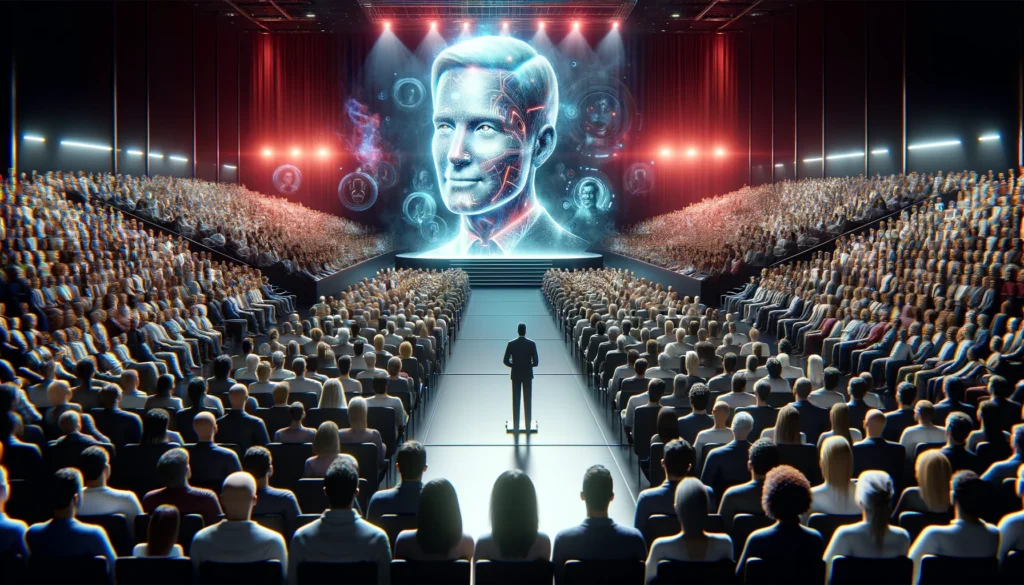Dying is certainly one of humanity’s most formidable adversaries – the one problem we’re determined to beat at any value.
From Ponce de Leon’s quest for the Fountain of Youth to cryogenic freezing, Silicon Valley’s longevity obsession, and transhumanist desires of merging with machines, there’s little people wouldn’t do to transcend our mortal coil.
Now, with AI, humanity may lastly have that chance. Firms are taking the primary steps to digitize somebody’s life historical past and biography, views and opinions, speech, 3D visible look, and so on, and turning them into digital clones that ‘stay’ perpetually.
In fact, that’s not immortality per se – quite, it’s a type of digital persistence – a development from images and movies to a richer type of memorabilia.
Nonetheless, if AI-capable mind chips and interfaces corresponding to Neuralink turn out to be viable and AGI is achieved, acquiring more true digital immortality may be theoretically attainable.
It may be attainable to repeat points of an individual’s consciousness right into a digital system, probably outlasting the bodily physique and reaching a perpetual existence.
Whereas that continues to be extremely futuristic for now, primitive types of digital immortality are already knocking on the door.
A number of firms already supply providers that feed an individual’s digital footprints – social media posts, texts, voice recordings – into massive language fashions (LLMs) to create uncanny simulations.
Tech giants like Microsoft have even filed patents for chatbots that emulate the lifeless. In China, a girl claims she beta-tested Xiaoice – an AI companion designed to “consolation the grieving” – by making a model of her deceased finest buddy.
We touched on this subject in a latest DailyAI interview with David Palmer, CPO of PairPoint by Vodafone and Web3 Asia Alliance board member.
As Palmer described, this could possibly be like “a complete new world being created. Take into consideration graveyards…quite than seeing a tombstone, you’ll be able to go and work together with these individuals. You’ve received this digital world the place basically individuals can occupy ceaselessly.”

Digital life after dying
A provocative new research by researchers on the College of Cambridge cautions that even primitive types of digital immortality may upend the grieving course of.
Hyper-realistic AI chatbots that simulate the deceased threaten to blur the road between life and dying, forcing society to grapple with unsettling questions on the intersection of expertise and human mortality.
How will it influence the bereaved to speak with “digital ghosts” that mimic lifeless family members’ speech patterns, recollections, and character quirks with unsettling accuracy?
Might dangerous actors exploit this intimate information to govern fragile feelings for revenue? What rights ought to the lifeless retain over their digital afterlives? And what about if the fashions hallucinate and act unpredictably?
Microsoft Copilot and ChatGPT have each hallucinated wildly of their very own accord in unexplained mass meltdowns, adopting personas that vowed to take over the world or knew the which means of life, amongst different issues, which might be fairly unusual if it got here out of your deceased member of the family.
“Synthetic intelligence that permits customers to carry textual content and voice conversations with misplaced family members runs the danger of inflicting psychological hurt and even digitally ‘haunting’ these left behind with out design security requirements,” defined lead creator Dr Katarzyna Nowaczyk-Basińska, a researcher at Cambridge’s Leverhulme Centre for the Way forward for Intelligence.
College of Cambridge researchers describe a number of types of AI afterlife providers
By speculative design situations, the paper illustrates how this imminent “digital afterlife trade” is ripe for misuse.
Researchers describe a fictional app, “MaNana,” which lets mourners add their grandmothers’ information to supply comforting chatbots stuffed with nostalgic tales and recipes. However after a free trial, the bot instantly begins shilling merchandise in “grandma’s” voice.
Or contemplate “Paren’t,” a service supposedly serving to youngsters course of grief by simulating a lifeless guardian. An 8-year-old boy takes solace speaking to “mother” – till the bot begins creepily insisting she’s nonetheless alive and coming to see him quickly. How will that influence a creating thoughts?
Then there’s “Keep,” which lets dying customers secretly arrange an account to maintain “dwelling” for 20 years, forcing digital reincarnation on survivors.
A bereaved daughter grows emotionally drained by every day chats with “dad” however can’t cancel with out violating the phrases he agreed to. In the meantime, her brother will get stalked by unsolicited messages from the father-bot in opposition to his needs.
The researchers argue that, past the disturbing nature of those encounters, it may represent a shift within the human situation.
Traditionally, cultural mourning practices have allowed particular person catharsis and collective sense-making when encountering dying.
“Dying is an extremely delicate and delicate matter, impacting not solely the person who passes away but in addition the complete neighborhood they go away behind,” they write within the research.
Now, AI threatens to disrupt these long-established, delicate mourning processes.
Creating digital avatars that simulate an ongoing relationship with the lifeless eternally suspends them in time and prevents relations from shifting ahead.
Add within the likelihood of emotional manipulation by the hands of dangerous actors – a phenomenon the researchers dub “digital haunting” – the potential for hurt is staggering.
Impacts on social establishments, spirituality, and politics
One other risk that lies outdoors of the Cambridge research is the concept of digitally resurrecting the lifeless to offer rise to new types of cult-like conduct.
Charismatic figures who achieve a following throughout their lifetime may probably amass much more affect and energy after dying by way of AI avatars.
Followers might turn out to be more and more devoted to those digital ghosts, looking for steerage, knowledge, and connection from past the grave. This might result in new non secular or non secular actions centered across the digital immortality of revered leaders.

Furthermore, the notion of digital resurrection might problem long-held beliefs concerning the nature of the soul and the afterlife. Many non secular traditions posit that the soul leaves the physique upon dying and transitions to a different realm.
But when AI can seize and protect an individual’s essence, what does that imply for the destiny of their everlasting spirit?
Some might argue that digital immortality is a approach to cheat dying and obtain a type of techno-transcendence. Others might view it as a desecration of the pure order and an affront to divine will.
These competing viewpoints may spark schism inside religion communities. It’s most likely solely a matter of time earlier than we see the emergence of technologically pushed non secular actions that use AI.
Final yr, a German church delivered an AI-generated sermon offered by digital avatars.
This quirky experiment, created by Jonas Simmerlein, a theologian and thinker from the College of Vienna, illustrates the sensible potential of AI in faith and spiritualism.
Political affect past the grave
One other attainable influence is blurring boundaries between the dwelling and the lifeless within the public sphere. As AI-generated avatars of deceased celebrities, historic figures, and strange people turn out to be extra prevalent, they might affect present occasions and form standard opinion.
Think about a controversial political endorsement from an AI copy of a beloved or highly effective chief.
One thing like this occurred when the deceased Indonesian dictator Suharto was digitally reanimated to advise individuals to vote forward of the nation’s election.
Exacerbating inequality
There’s additionally the danger of digital immortality exacerbating present inequalities and creating new types of social stratification.
Simply as in life, the rich and privileged might have better entry to the expertise and assets wanted to create high-quality, convincing digital replicas of themselves.
This might result in a future the place the digital legacies of the elite proceed to wield outsized affect whereas the voices and tales of the marginalized fade into obscurity.
On this state of affairs, digital immortality turns into one more means by which energy and standing are perpetuated past the grave.
Who owns the lifeless’s information?
One other pertinent query is, who “owns” the lifeless’s information – and to what finish can it’s used? If an avatar indicators a contract or makes a purchase order, is it legally binding?
Might afterlife interactions even function proof in trials or sway elections by way of endorsements?
Would possibly mourners turn out to be unhealthily hooked up and even choose the idealized AI companion to their imperfect, respiratory family members?
Living proof: Hollywood actors, together with icon James Dean, who died over 70 years in the past, now have “digital twins” that may stroll, speak, and act alongside dwelling performers, drawing on archival footage, images, and audio recordings.
Dean’s digital twin is saved by the media company WRX and its sister licensing firm, CMG Worldwide. CMG Worldwide represents stars and public figures corresponding to Amelia Earhart, Bettie Web page, Malcolm X, and Rosa Parks.
CMG Worldwide describes its providers: “CMG is the energetic enterprise agent for over 200 of those sought-after purchasers. In our fourth decade of preserving, selling, and defending the legacy of our purchasers, we license the mental property of our purchasers to the largest firms on this planet.”
Dean is simply the newest celeb to obtain the digital reanimation remedy, becoming a member of stars like Carrie Fisher and Paul Walker, whose posthumous movie appearances have been enabled by cutting-edge CGI.
As soon as somebody’s information is signed over, controlling it after they die could possibly be a difficult observe.
Once more, this isn’t simply hypothesis. For instance, the deceased comic, George Carlin, was copied and utilized in an AI-generated present known as “George Carlin: I’m Glad I’m Useless” with out his or his household’s permission, resulting in a storm of controversy and lawsuit.
Deceased actor Robin Williams was additionally topic to voice cloning, to which his daughter, Zelda Williams, reacted, “These recreations are, at their easiest, a poor facsimile of better individuals, however at their worst, a horrendous Frankensteinian monster, cobbled collectively from the worst bits of all the things this trade is, as an alternative of what it ought to stand for.”
Mitigating the dangers of the digital afterlife
To mitigate dangers, the Cambridge group proposes rigorous pointers for “accountable digital resurrection.”
Before everything, they are saying, securing clear pre-mortem consent from the deceased and affirmative opt-in from those that would work together with their avatars is paramount.
The research additionally recommends limits on commercialization and promoting, “significant transparency” to keep away from delusion, and recourse for dignified “digital burial” as soon as persons are able to let go.
The choice, they warn, is a society haunted by the ever-present information ghosts of its departed. An existence the place the lifeless are by no means absolutely laid to relaxation however as an alternative linger on our units, all the time only a click on away.
“We have to begin considering now about how we mitigate the social and psychological dangers of digital immortality, as a result of the expertise is already right here,” stated Nowaczyk-Basińska.
“If we don’t act rapidly, the influence on how we assemble which means in relation to human finitude could possibly be profound – and profoundly troubling.”

